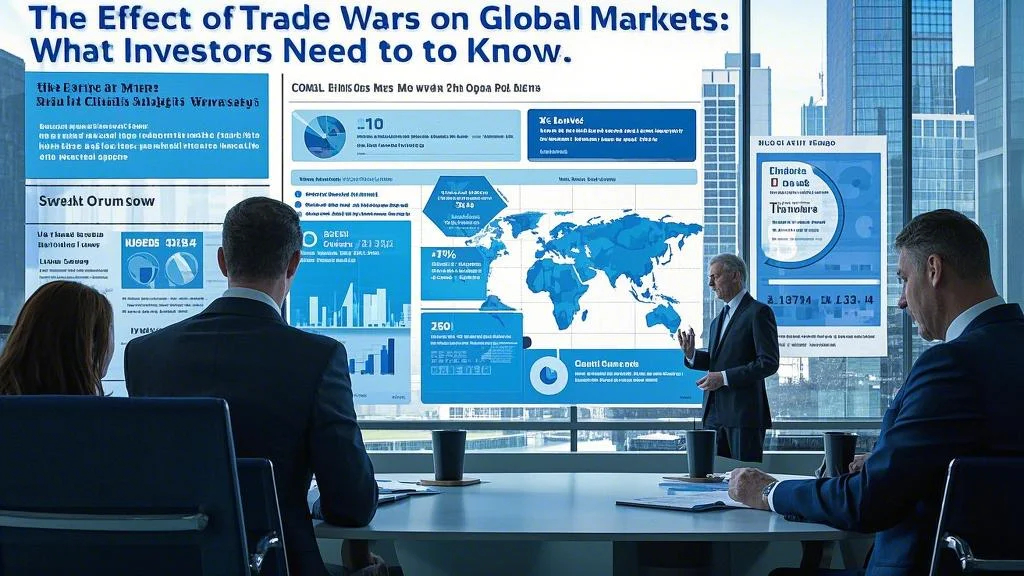The Effect of Trade Wars on Global Markets: What Investors Need to Know

Understanding the Trade War Impact on Global Markets
The trade war impact on global markets has been a significant concern for investors, businesses, and policymakers alike. Trade wars, characterized by tariffs, trade barriers, and retaliatory measures between nations, disrupt the flow of goods and services, leading to increased costs and economic uncertainty. For example, the U.S.-China trade war has resulted in higher tariffs on billions of dollars worth of goods, affecting industries ranging from technology to agriculture. These disruptions can lead to reduced corporate earnings, supply chain inefficiencies, and slower global economic growth. For investors, understanding the trade war impact is crucial for anticipating market movements and adjusting portfolios to mitigate risks. By staying informed about trade developments and their implications, you can make more strategic investment decisions.
How Global Economic Trends Are Shaped by Trade Wars
Trade wars are a key driver of global economic trends, influencing everything from GDP growth to inflation rates. When major economies impose tariffs on each other, it often leads to higher prices for imported goods, which can contribute to inflation. Additionally, trade wars can disrupt global supply chains, leading to delays and increased costs for businesses. These factors can slow down economic growth and create uncertainty in financial markets. On the other hand, trade wars can also lead to shifts in global trade patterns, with some countries benefiting from increased demand for their exports. For investors, understanding how trade wars shape global economic trends is essential for identifying opportunities and risks in the global market. By staying ahead of these trends, you can position your portfolio to navigate the complexities of international trade.
Commodities Market Outlook in a Trade War Environment
The commodities market outlook is heavily influenced by trade wars, as tariffs and trade barriers can disrupt the supply and demand dynamics of key commodities. For example, agricultural commodities like soybeans and corn have been directly impacted by the U.S.-China trade war, with Chinese tariffs reducing demand for U.S. exports. Similarly, metals like steel and aluminum have faced higher tariffs, affecting industries that rely on these materials. On the other hand, trade wars can create opportunities for commodity producers in countries not directly involved in the conflict. For investors, understanding the commodities market outlook in a trade war environment is crucial for identifying potential winners and losers. By diversifying your portfolio and focusing on commodities with strong fundamentals, you can mitigate risks and capitalize on opportunities.

Emerging Markets Investment Amid Trade Wars
Emerging markets are particularly vulnerable to the trade war impact, as they often rely heavily on exports and foreign investment. However, they can also present unique opportunities for investors. For example, countries that are not directly involved in trade wars may benefit from increased demand for their exports as global trade patterns shift. Additionally, emerging markets with strong domestic economies and growing middle classes may be less affected by trade tensions. For investors, understanding the dynamics of emerging markets investment in a trade war environment is essential for identifying high-growth opportunities. By focusing on countries with strong fundamentals and diversified economies, you can reduce your exposure to trade war risks and capitalize on the growth potential of emerging markets.
Economic Downturn Strategies for Navigating Trade Wars
Trade wars can contribute to economic downturns by disrupting global trade, increasing costs, and creating uncertainty. For investors, adopting effective economic downturn strategies is crucial for navigating these challenges. One approach is to focus on defensive sectors like healthcare, utilities, and consumer staples, which tend to perform well during economic downturns. Another strategy is to diversify your portfolio across different geographic regions and asset classes, reducing your exposure to localized market fluctuations. Additionally, consider investing in companies with strong balance sheets and consistent cash flow, as these are better positioned to weather economic challenges. By adopting these economic downturn strategies, you can protect your portfolio from the negative effects of trade wars and position yourself for long-term success.
How to Adjust Your Investment Strategy in a Trade War Environment
Adjusting your investment strategy in a trade war environment requires a proactive and informed approach. Start by staying informed about the latest trade developments and their potential impact on different sectors and markets. Focus on companies and industries that are less reliant on international trade, reducing your exposure to trade war risks. Additionally, consider diversifying your portfolio with alternative investments like real estate, commodities, and infrastructure, which can provide stability and inflation protection. Regularly reviewing and rebalancing your portfolio is also important, as market conditions and trade dynamics can change rapidly. By staying informed about the trade war impact and adopting a diversified approach, you can navigate the complexities of global markets and position your portfolio for long-term success.
Conclusion: Navigating the Complexities of Trade Wars
The trade war impact on global markets is a complex and evolving issue that requires careful consideration by investors. By understanding how trade wars shape global economic trends, influence the commodities market outlook, and affect emerging markets investment, you can make informed decisions and adjust your strategy accordingly. Additionally, adopting effective economic downturn strategies can help you navigate the challenges of trade wars and protect your portfolio from market volatility. By staying proactive and informed, you can position yourself for success in the ever-changing global market landscape. The key is to remain adaptable and focused on your long-term investment goals, no matter what challenges arise.